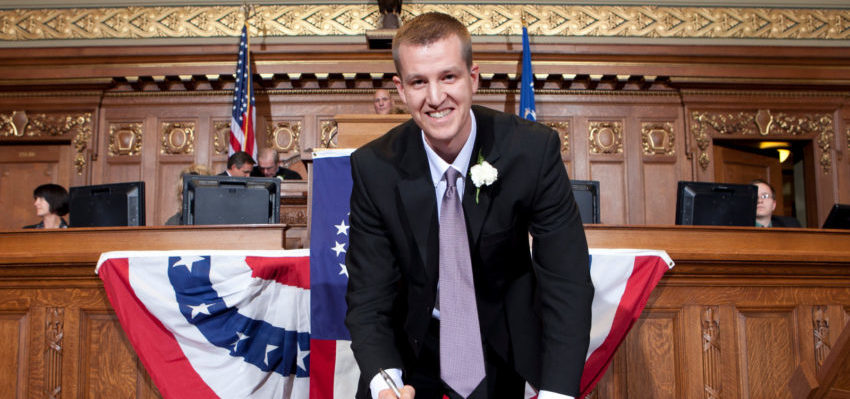 .@DaleKooyenga: Border sign should say ‘WI is open for business,’ but also, open for free markets. Click To Tweet
.@DaleKooyenga: Border sign should say ‘WI is open for business,’ but also, open for free markets. Click To Tweet
MacIver News Service | November 27, 2017
By M.D. Kittle
MADISON, Wis. – A Brookfield Republican lawmaker says his party has done well in making Wisconsin “open for business,” but the GOP has failed at times in keeping the Badger State open to the free market.
Kooyenga says businesses long protected by anti-free-market carveouts carry a lot of influence at the Capitol, and they want to keep the status quo.
State Rep. Dale Kooyenga asserts there are many examples where Republicans are unwilling to reform protectionist laws that benefit certain businesses at the expense of consumers.
“After seven years, Republicans are very hesitant to take on policies that businesses are not in favor of, and that’s not what we should be as a party,” Kooyenga told MacIver News Service last week on the Dan O’Donnell Show, on NewsTalk 1130 WISN. “I think the sign in Wisconsin should say not only, ‘Wisconsin is open for business,’ but, ‘Wisconsin is open for business and free markets.’”
Perhaps the worst clash of conservative, free-market principles and protectionism is Wisconsin’s antiquated minimum markup law.
Also known as the Unfair Sales Act, minimum markup is a relic of the Great Depression. The law essentially makes it illegal for retailers and wholesalers to sell merchandise at a steep discount. It also mandates that gasoline and other certain products be marked up at least 9.18 percent above the wholesale cost.
As MacIver News Service pointed out again this year, shoppers unwittingly found themselves “accomplices” to the crime of special low-price Black Friday deals that fly in the face of Wisconsin’s minimum markup law. In all seriousness, retailers face steep fines for selling goods under the artificially higher prices.
Last legislative session, Sen. Leah Vukmir (R-Wauwatosa) and Rep. Jim Ott (R-Mequon) introduced a bill that would eliminate the Unfair Sales Act. The repeal bill did not receive even a public hearing in either house.
In this year’s budget battle, Kooyenga offered a proposal that would cut into the antiquated pricing structure. That measure, too, went nowhere.
The Republican lawmaker, who also pitched a flat tax proposal, said the minimum markup is worse than a tax.
“At least a tax goes to your school or roads. This is a tax that goes to a private business,” Kooyenga said.
Unfair Sales Act proponents have long insisted that without such “protections” smaller mom-and-pop stores will be the prey of predatory pricing. But such practices are rare, according to the Federal Trade Commission.
“Can prices ever be ‘too low?’ The short answer is yes, but not very often,” the agency notes in an online Q&A.
In 2016, Wisconsin was just one of 16 states with a minimum markup law.
Kooyenga, running for Vukmir’s state senate seat as Vukmir campaigns for U.S. Senate, says businesses long protected by anti-free-market carveouts carry a lot of influence at the Capitol, and they want to keep the status quo.
“I’m not going to be a jerk about it with people I respect, but I think we need to be consistent Republicans and say we need to fight for free markets because it’s the right thing to do,” the conservative said. “And we’ll see more economic growth if we embrace these (free market) policies.”